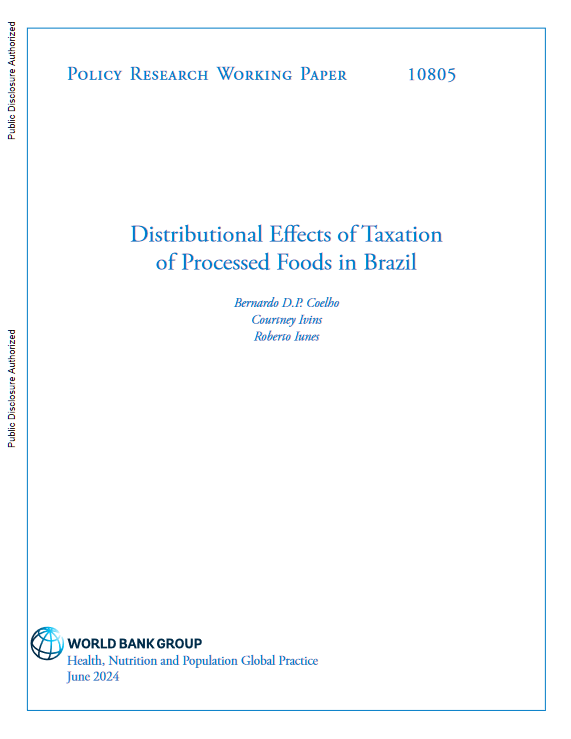Distributional Effects of Taxationof Processed Foods in Brazil
UltraprocessadosIt is estimated that non-communicable diseases (NCDs) cause over 70% of deaths worldwide (WHO, 2022). Among these, an estimated 7.9 million deaths and 187.7 million disability-adjusted life-years (DALYs) were attributable to dietary risk factors in 2019 (Qiao et al., 2021). Unhealthy diets – linked to leading NCDs like diabetes, heart disease, stroke, and cancer – are characterized by low consumption of whole grains, fruit, vegetables, nuts and seeds, fiber, polyunsaturated fatty acids, omega-3 oils, calcium, or milk, and/or high consumption of sodium, trans-fats, processed and red meat, and sugary drinks (as classified by Global Burden of Disease studies) (PAHO, 2023).
Increased dietary risk has contributed to an unprecedented rise in overweight and obesity. The first report
from the Lancet Commission on Obesity described this rise, together with undernutrition and climate
change, as a “Global Syndemic”, a synergy of epidemics sharing common societal drivers including food
and agriculture, transportation, urban design, and land use systems (Swinburn et al., 2019). Due to factors
such as limited political leadership, coordination, and public demand, and strong commercial lobbies, no
country has managed to reverse the rise in obesity prevalence over the last four decades, despite three
decades of World Health Assembly commitments and the UN designation of 2016-2025 as the “Decade of Nutrition” (Swinburn et al., 2019). The Americas is the World Health Organization (WHO) region with the highest prevalence of overweight and obesity, estimated at 62.5% and 28% respectively in 2016 (PAHO, 2023).
In addition to contributing to obesity and overweight (which in turn increases NCD risk), ultra-processed
foods have been independently linked to a range of negative health outcomes, informing policy efforts to
reduce their consumption to promote healthy diets and reduce the burden of diet related NCDs, as
recommended by the Framework for Action from the Second International Conference on Nutrition
(2014). Fiscal policies – both taxes and subsidies – have gained increasing traction as tools to influence
healthier consumption. While more substantial research has been conducted on taxation of alcohol,
tobacco, and sugar-sweetened beverage (so-called “health taxes” or “sin taxes”), studies on fiscal policies
to influence healthy food consumption have been more limited. In particular, evidence on impacts of such policies on subpopulations is a notable and persistent gap in the literature, essential to ensure policies are assessed and designed with an equity lens.
Health taxes have been proposed in Brazil to address the country’s growing burden of obesity and NCDs.
More than half of Brazilian adults are overweight (60.3%, or 96 million people – including one in five
teenagers aged 15-17), and 25.9% of adults is obese (41.2 million people), with higher prevalence among
women (World Bank, 2022). This has been accompanied by Brazil’s alarming rise in NCDs, now responsible
for almost 75% of deaths in the country. Brazil’s changing dietary profile is characterized by increased
consumption of ultra-processed foods, which rose as a proportion of household caloric intake from 12.6%
in 2002-2003 to 18.4% in 2017-2018 (Machado, 2022). Considering the established links of the
consumption of ultra-processed foods in Brazil and globally with negative health outcomes, including
mortality, obesity, and NCDs, policy measures to reduce consumption may effectively contribute to
reduce premature mortality and promote health status, thus contributing more broadly to human capital
development.
This study addresses gaps in the health tax literature by assessing equity impacts of a potential tax on
ultra-processed foods in Brazil. Applying a statistical model to assess welfare changes in terms of net
income effects, findings indicate that an ultra-processed food tax would have a progressive impact. Tax
burdens increase among higher consumption deciles, whereas lower consumption deciles experience
welfare gains in terms of product expenditure, and from reductions in years of life lost and medical
expenditure resulting from reduced ultra-processed food consumption. Section 2 of the paper provides a
review of the literature, including on the concepts of processed and ultra-processed foods, the evidence
on their negative health impacts and their consumption and production in Brazil, international
experiences on taxing unhealthy foods, and methodologies for assessing the progressiveness of taxation.
Sections 3 and 4, respectively, describe the paper’s methodology and provide an overview of the data and
descriptive statistics it employs. Section 5 describes the study results in terms of elasticity and changes in
product expenditure, medical expenditure, and years of life lost. Section 6 discusses policy implications of
these findings.
Voltar

